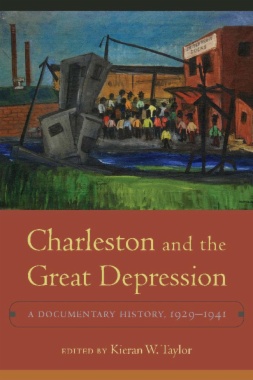A chronicle of perseverance and hope in the face of economic crises and political change
Charleston and the Great Depression tells many stories of the city during the 1930s—an era of tremendous want, hope, and change—through a collection of forty annotated primary documents. Included are letters, personal accounts, organizational reports, meeting minutes, speeches, photographs, oral history excerpts, and trial transcripts. Together they reveal the various ways in which ordinary lowcountry residents—largely excluded from formal politics—responded to the era's economic and social crises and made for themselves a "New Deal."
Arranged in chronological order, the documents include Mayor Burnet R. Maybank's 1931 inaugural address, in which the thirty-two-year-old merchant-turned-politician warned grimly of worsening hardship; the trial testimony of Benjamin Rivers, an African American worker executed by the state after being convicted of murdering a Charleston police officer; horror writer H. P. Lovecraft's detailed walking tour of the city, in which the visiting New Englander painted a fascinating but romanticized portrait of Charleston that somehow managed to overlook the adversities facing the local population; and Susan Hamilton's powerful and contradictory memories of her enslavement, gathered as part of the Federal Writers Project.
The Great Depression was an era of economic crises and political change but was also a period of great hope and possibility as Americans from across the political spectrum persevered through hard times, driven by the conviction that government power could and should be used to alleviate suffering and create opportunities to better people's lives. These documents capture the voices of diverse Charleston residents—from farmers and dockworkers to students, ministers, public officials, and social workers—as they struggled and strove for a better city and a better country.
- Cover�������������������������������
- Charleston and the Great Depression�������������������������������������������������������������������������������������������������������������������������
- Title�������������������������������
- Copyright�������������������������������������������
- Contents����������������������������������������
- Acknowledgments�������������������������������������������������������������
- Editorial Principles and Practices����������������������������������������������������������������������������������������������������������������������
- Chronology����������������������������������������������
- Introduction����������������������������������������������������
- 1930����������������������������
- Fong Lee Wong to Laura Bragg, 4 March 1930����������������������������������������������������������������������������������������������������������������������������������������������
- Eleanor Loeb Halsey, “Narrative Report,” Charleston County Tuberculosis Association, August 1930����������������������������������������������������������������������������������������������������������������������������������������������������������������������������������������������������������������������������������������������������������������������������������������������������������������
- 1931����������������������������
- The State of South Carolina v. Ray Laurens, 12 October 1931�������������������������������������������������������������������������������������������������������������������������������������������������������������������������������������������������
- Burnet R. Maybank, Inaugural Address, 14 December 1931����������������������������������������������������������������������������������������������������������������������������������������������������������������������������������
- 1932����������������������������
- The City Council of Charleston, Minutes, 26 January 1932����������������������������������������������������������������������������������������������������������������������������������������������������������������������������������������
- Ella L. Smyrl to Cordella A. Winn, 26 January 1932����������������������������������������������������������������������������������������������������������������������������������������������������������������������
- William McKinley Bowman to Franklin D. Roosevelt, 25 November 1932����������������������������������������������������������������������������������������������������������������������������������������������������������������������������������������������������������������������
- 1933–1934�������������������������������������������
- Burnet R. Maybank to John L. M. Irby, 25 September 1933�������������������������������������������������������������������������������������������������������������������������������������������������������������������������������������
- John L. M. Irby to Burnet R. Maybank, 25 September 1933�������������������������������������������������������������������������������������������������������������������������������������������������������������������������������������
- Lorena A. Hickok to Harry L. Hopkins, 10 February 1934����������������������������������������������������������������������������������������������������������������������������������������������������������������������������������
- 1935����������������������������
- Norma Mazo, Payday, 1935����������������������������������������������������������������������������������������
- Benjamin F. Cox, Avery Institute, Annual Report, August 1935����������������������������������������������������������������������������������������������������������������������������������������������������������������������������������������������������
- Franklin D. Roosevelt to Clergy, 24 September 1935����������������������������������������������������������������������������������������������������������������������������������������������������������������������
- A. D. Prentiss to Franklin D. Roosevelt, 27 September 1935����������������������������������������������������������������������������������������������������������������������������������������������������������������������������������������������
- DuBose Heyward, “Porgy and Bess Return on Wings of Song,” October 1935����������������������������������������������������������������������������������������������������������������������������������������������������������������������������������������������������������������������������������
- Elijah J. Curry to Franklin D. Roosevelt, 5 October 1935����������������������������������������������������������������������������������������������������������������������������������������������������������������������������������������
- Franklin D. Roosevelt, Remarks at the Citadel: The Military College of South Carolina, 23 October 1935����������������������������������������������������������������������������������������������������������������������������������������������������������������������������������������������������������������������������������������������������������������������������������������������������������������������������������
- 1936����������������������������
- H. P. Lovecraft to Herman Charles Koenig, 12 January 1936�������������������������������������������������������������������������������������������������������������������������������������������������������������������������������������������
- Walker Evans, 19th Century Shop-Front, Charleston, S.C., March 1936�������������������������������������������������������������������������������������������������������������������������������������������������������������������������������������������������������������������������
- Allen Jones Jr., Diary, 6 March 1936����������������������������������������������������������������������������������������������������������������������������
- The State v. Benjamin J. Rivers, 25 September 1936����������������������������������������������������������������������������������������������������������������������������������������������������������������������
- 1937����������������������������
- John L. M. Irby to William Watts Ball, 26 May 1937����������������������������������������������������������������������������������������������������������������������������������������������������������������������
- Susan Calder Hamilton, Interview by Augustus Ladson, May–June 1937����������������������������������������������������������������������������������������������������������������������������������������������������������������������������������������������������������������������
- Susan Calder Hamilton, Interview by Jessie A. Butler, 6 July 1937�������������������������������������������������������������������������������������������������������������������������������������������������������������������������������������������������������������������
- Susan Calder Hamilton, Interview by Jessie A. Butler, November 1937�������������������������������������������������������������������������������������������������������������������������������������������������������������������������������������������������������������������������
- Program, The Recruiting Officer, Dock Street Theatre Dedication, 26 November 1937�������������������������������������������������������������������������������������������������������������������������������������������������������������������������������������������������������������������������������������������������������������������
- 1938–1940�������������������������������������������
- Photographs from the Charleston Tornadoes, September 1938�������������������������������������������������������������������������������������������������������������������������������������������������������������������������������������������
- Marion Post Wolcott, Negro Home near Charleston, South Carolina, December 1938����������������������������������������������������������������������������������������������������������������������������������������������������������������������������������������������������������������������������������������������������������
- Marion Post Wolcott, The Cook on a Fishing Boat in Charleston, South Carolina, Peeling Potatoes for Christmas Dinner, 25 December 1938����������������������������������������������������������������������������������������������������������������������������������������������������������������������������������������������������������������������������������������������������������������������������������������������������������������������������������������������������������������������������������������������������������������������������������
- Ruby and John Lomax, Field Notes, 6–8 June 1939�������������������������������������������������������������������������������������������������������������������������������������������������������������
- Box Score, Columbus Red Birds vs. Charleston Rebels, 24 July 1940�������������������������������������������������������������������������������������������������������������������������������������������������������������������������������������������������������������������
- 1941����������������������������
- Leon Banov to Burnet R. Maybank, 15 November 1941�������������������������������������������������������������������������������������������������������������������������������������������������������������������
- Elizabeth Maybank to Joseph Maybank, 14 December 1941�������������������������������������������������������������������������������������������������������������������������������������������������������������������������������
- Memories of the Great Depression, 1996–2012�������������������������������������������������������������������������������������������������������������������������������������������������
- Gordan B. Stine, Interview by Dale Rosengarten, 19 February 1996����������������������������������������������������������������������������������������������������������������������������������������������������������������������������������������������������������������
- Abe Dumas, Interview by Michael Grossman, 14 December 1996����������������������������������������������������������������������������������������������������������������������������������������������������������������������������������������������
- Shera Lee Ellison Berlin, Interview by Dale Rosengarten and Michael Grossman, 16 April 1997�������������������������������������������������������������������������������������������������������������������������������������������������������������������������������������������������������������������������������������������������������������������������������������������������
- William F. Ladson, Interview by Kieran W. Taylor, 13 May 2009�������������������������������������������������������������������������������������������������������������������������������������������������������������������������������������������������������
- Anne Marie Gilliard, Interview by Clarissa D. Brown, 2 October 2011�������������������������������������������������������������������������������������������������������������������������������������������������������������������������������������������������������������������������
- Virginia Bonnette, Interview by Virginia Ellison and Kieran W. Taylor, 15 March 2012����������������������������������������������������������������������������������������������������������������������������������������������������������������������������������������������������������������������������������������������������������������������������
- Henry W. Fleming, Interview by Danielle Lightner, 17 March 2012�������������������������������������������������������������������������������������������������������������������������������������������������������������������������������������������������������������
- Herman Stramm, Interview by Luke Yoder, 19 March 2012�������������������������������������������������������������������������������������������������������������������������������������������������������������������������������
- Index�������������������������������

